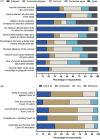Willingness to receive COVID-19 booster dose and its associated factors in Ghana: A cross-sectional study
- PMID: 37064312
- PMCID: PMC10090037
- DOI: 10.1002/hsr2.1203
Willingness to receive COVID-19 booster dose and its associated factors in Ghana: A cross-sectional study
Abstract
Background and aim: The COVID-19 booster dose has been cited as an important supplement for the control of the COVID-19 pandemic due to reports of waning immunity among fully vaccinated persons. Determining factors that would affect its acceptability is necessary for initiating successful vaccination programs. In this study, we aimed to evaluate the factors associated with the acceptability of the COVID-19 booster dose in Ghana.
Methods: We conducted an online cross-sectional survey among the public. A self-administered questionnaire was used to collect information on demographic characteristics, willingness to vaccinate, perceptions toward COVID-19 vaccines, and trust in the government. Participants provided reasons and sources of advice that may affect their willingness to accept a booster dose. Using IBM SPSS and R Statistic; descriptive, univariate, and multivariate analyses were performed.
Results: Out of 812 respondents, 375 (46.2%) intended to accept the booster dose. Individuals who were males (adjusted odds ratio [aOR] 1.63, 95% confidence interval [CI] 1.07-2.48), had previously received other forms of vaccination twice (aOR 1.96, 95% CI 1.07-3.57) or in most years (aOR 2.51, 95% CI 1.38-4.57), tested positive for COVID-19 (aOR 3.46, 95% CI 1.23-10.52), have high trust in government (aOR=1.77, 95% CI: 1.15-2.74) and had positive perceptions regarding COVID-19 vaccines (OR = 14.24, 95% CI: 9.28-22.44) were more likely to accept a booster dose. Experiencing side effects from the primer dose (aOR 0.12, 95% CI 0.08-0.18) was associated with reduced acceptance. Concerns about vaccine safety and efficacy were the common reasons impeding willingness, while advice from health professionals would be the most considered.
Conclusion: Low intention to accept the booster dose which is associated with a range of factors including the perception of vaccines and trust in the government, is a cause for concern. Thus, more effort would have to be taken through education and policy interventions to increase booster vaccine acceptability.
Keywords: COVID‐19; Ghana; booster dose; vaccine; vaccine acceptance; willingness.
© 2023 The Authors. Health Science Reports published by Wiley Periodicals LLC.
Conflict of interest statement
The authors declare no conflict of interest.
Figures



Similar articles
-
Factors associated with COVID-19 booster vaccine willingness among migrants from the Eastern Mediterranean living in Australia: a cross-sectional study.BMC Public Health. 2022 Nov 28;22(1):2205. doi: 10.1186/s12889-022-14608-5. BMC Public Health. 2022. PMID: 36443806 Free PMC article.
-
Preference and Willingness to Pay for the Regular COVID-19 Booster Shot in the Vietnamese Population: Theory-Driven Discrete Choice Experiment.JMIR Public Health Surveill. 2023 Jan 31;9:e43055. doi: 10.2196/43055. JMIR Public Health Surveill. 2023. PMID: 36599156 Free PMC article.
-
Acceptance of the COVID-19 vaccine booster dose and associated factors among the elderly in China based on the health belief model (HBM): A national cross-sectional study.Front Public Health. 2022 Dec 15;10:986916. doi: 10.3389/fpubh.2022.986916. eCollection 2022. Front Public Health. 2022. PMID: 36589991 Free PMC article.
-
Acceptance of Annual Booster Doses of COVID-19 Vaccines Among Indian Healthcare Professionals: A Pan-India Cross-Sectional Survey.Cureus. 2023 Nov 24;15(11):e49363. doi: 10.7759/cureus.49363. eCollection 2023 Nov. Cureus. 2023. PMID: 38146559 Free PMC article.
-
Association Between Risk Perception and Acceptance for a Booster Dose of COVID-19 Vaccine to Children Among Child Caregivers in China.Front Public Health. 2022 Mar 16;10:834572. doi: 10.3389/fpubh.2022.834572. eCollection 2022. Front Public Health. 2022. PMID: 35372197 Free PMC article.
Cited by
-
COVID-19 Vaccination Booster Dose: Knowledge, Practices, and Intention among Pregnant/Planning to Get Pregnant and Lactating Women.Vaccines (Basel). 2023 Jul 17;11(7):1249. doi: 10.3390/vaccines11071249. Vaccines (Basel). 2023. PMID: 37515064 Free PMC article.
-
Healthcare workers' willingness to receive COVID-19 booster dose and associated factors in the Democratic Republic of the Congo.Hum Vaccin Immunother. 2024 Dec 31;20(1):2357214. doi: 10.1080/21645515.2024.2357214. Epub 2024 May 23. Hum Vaccin Immunother. 2024. PMID: 38783665 Free PMC article.
-
Exploring the relationship between experience of vaccine adverse events and vaccine hesitancy: A scoping review.Hum Vaccin Immunother. 2025 Dec;21(1):2471225. doi: 10.1080/21645515.2025.2471225. Epub 2025 Mar 9. Hum Vaccin Immunother. 2025. PMID: 40058398 Free PMC article.
-
Acceptance of COVID-19 vaccine booster doses among the Adult Population in Ghana: a cross-sectional study using the Health Belief Model.BMC Public Health. 2024 Sep 30;24(1):2673. doi: 10.1186/s12889-024-20201-9. BMC Public Health. 2024. PMID: 39350125 Free PMC article.
-
Factors associated with intention to be vaccinated with the COVID-19 booster dose: a cross-sectional study in Peru.PeerJ. 2024 Mar 29;12:e16727. doi: 10.7717/peerj.16727. eCollection 2024. PeerJ. 2024. PMID: 38563006 Free PMC article.
References
-
- Maital S, Barzani E. The global economic impact of COVID‐19: a summary of research. Samuel Neaman Inst Nat Pol Res. 2020;2020:1‐12.
-
- Poudel PB, Poudel MR, Gautam A, et al. COVID‐19 and its global impact on food and agriculture. J Biol Today's World. 2020;9(5):221‐225.
LinkOut - more resources
Full Text Sources

